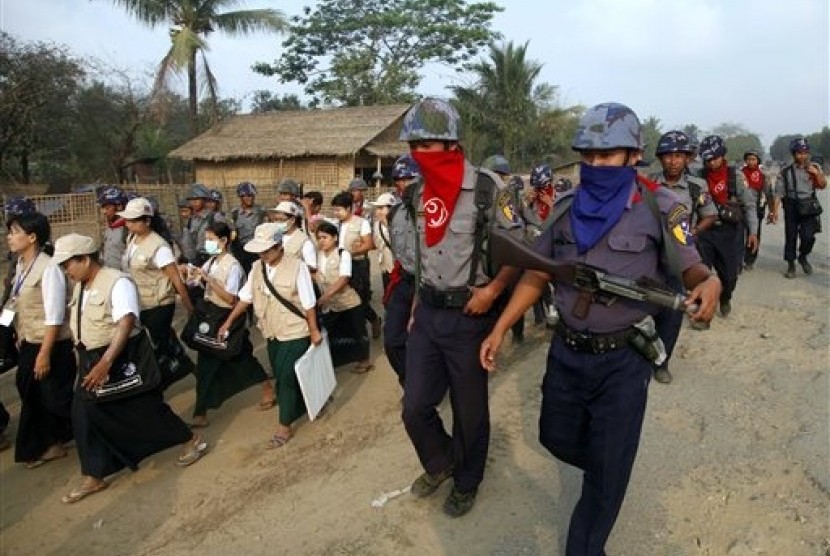REPUBLIKA.CO.ID, SITTWE - The first thing Khalid was asked when census workers entered his home in Myanmar's troubled state of Rakhine was his ethnicity. In a clear, confident voice, the father of eight responded "Rohingya." The workers, most of them school teachers, said thank you, turned around and left.
Accompanied by police, the women continued going from home to home in the tiny, dusty Muslim village, carrying their large box of mostly blank questionnaires. And with every same answer they moved on.
Myanmar, a predominantly Buddhist nation, only recently emerged from a half-century of military rule. Though it is carrying out its first census in 30 years, hundreds of thousands of members of the long-persecuted Muslim minority are likely to go uncounted.
No one knows exactly how many people live in the country. Estimates range between 45 million and 60 million, and getting a more accurate figure is crucial for national planning and development. But the inclusion of questions about race and ethnicity are seen as inflammatory — especially in Rakhine, which is home to an estimated 1.3 million Rohingya Muslims. Though many were born to families who arrived generations ago, the government considers them to be illegal immigrants from Bangladesh and denies them citizenship and related rights.
In the last two years members of the religious minority have been the target of bloody attacks by Buddhist mobs. Up to 280 have been killed and another 140,000 forced to flee their home. Most are now living in hot, dirty camps on the outskirts of the state capital, Sittwe.
Hours before census workers started their task Sunday, presidential spokesman Ye Htut announced that Rohingya would have to refer to themselves as "Bengalis" if they wanted to be counted.
That drew expressions of "deep concern" by the UN Population Fund — which spent years helping the government prepare for the count. It said it had been promised everyone would be allowed to identify themselves by whatever ethnicity they chose.
"In its agreement with the United Nations ... the government made a commitment to conduct the exercise in accordance with international census standards and human rights principles," the UN said in a statement. "It explicitly agreed with the condition that each person would be able to declare what ethnicity they belong to."
The about-face could spark new tensions, it said, and threatened to undermine the entire process. Rohingya have for the most part refused to bow to pressure by the government and extremist groups to call themselves by another name.
On Tuesday, the third day of counting, small groups of census collectors accompanied by armed police and local elders visited Muslim homes and camps in Chaung township.
"Ninety nine out of 100 Rohingya families who identified themselves as Rohingya, were not registered," said 29-year old Mohamad Roshi, who was working as a volunteer for census collectors.
"I wasn't registered either, because I told them I was Rohingya."
Tensions have been rising over the census for weeks, as ethnic Buddhists — worried that the census would serve to legitimize the presences of Rohingya — have hung Buddhist flags on almost every home and office in Rakhine as a form of protest.


